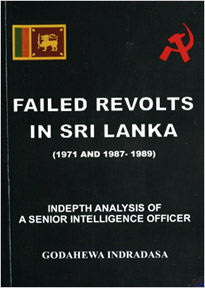|
Book review
JVP revolts: from the perspective of a law-enforcement officer
The JVP led insurrection of 1971 was unprecedented in scale in the
history of Sri Lanka. It was so not only on account of the number of
participants and its geographical spread. but also in terms of its
objectives. Though over 40 years have elapsed since then it is still a n
interesting subject of research for social scientists, historians and
students of politics.
The latest book on it is Failed revolts in Sri Lanka (1971 and 1987 -
1989) by Godahewa Indradasa retired Senior Intelligence Officer of the
Police department. Perhaps it is the first analysis of the event from
the perspective of a law-enforcement officer. As the title shows it also
has an analysis of the second JVP rebellion in the late nineties.
 Relying on his personal experience and published information the
author gives a reliable account of the formation of the Janatha Vimukti
Peramuna (JVP) and its formative years. Relying on his personal experience and published information the
author gives a reliable account of the formation of the Janatha Vimukti
Peramuna (JVP) and its formative years.
It is obvious that in doing so he has relied on the accounts given by
some leading personalities in the party who fell into custody and later
became personal friends. It is a fact that the professional law
enforcement officer who is not a stooge of the ruling dispensation and
is not an opportunist respects the suspect in his charge if he is a
professional revolutionary who acts with conviction and sincerity.
The author has a clear understanding of the socio-economic conditions
that gave rise to the formation of the JVP as well as the 1971
insurrection. Though he disagrees with the methods used he seems to be
in sympathy of the aspirations of rural youth for a better future. He
also ungrudgingly concedes that "Wijeweera was the person who gave
revolutionary inspiration to the village youth of Sri Lanka" (p. 24).
Contrary to the opinions expressed by certain political quarters he
refuted the notion that the JVP was a 'low caste'. "Although some caste
factors were operative it was certainly not a low caste movement at all,
and in general cross-cuts the caste issue.(pp 64-65)".
Despite his conclusion that the April insurrection was ill-planned,
amateurish and carried out hastily, he sympathetically describes it as
"a romantic and an innocent revolution" of educated rural youth and
'characterized by the innocence and tenderness inherent in them".How far
is this from the characterization of some Left politicians of the day
and self-styled theoreticians who see it as a CIA plot! It should be
recalled that the Government of the day reacted to the insurrection with
the first Land Reform in Sri Lanka - the Ceiling on Land Ownership Law
vindicating the aspirations of the insurgents. In thus describing the
1971 insurrection the author has gone the maximum distance with his
liberal outlook without compromising his position as a law enforcement
officer.
The author notes the inconsistencies of the JVP in its policy
concerning the National Question and says that by the time of the Second
rebellion in '987 - 89 the JVP has veered to a more nationalist policy
capitalizing on the separatist struggle and the peace process to win
over the Sinhala youth against the Government.
He says that people appeared to be confused with regard to the JVP
position on the self-determination of the Tamil people. He also
concludes that the JVP has still not offered any acceptable solution to
the north east conflict, which is a fundamental problem facing the
country.
The author also shows how the second insurrection differs from the
first in its objectives and methodology and how it was defeated by the
Government capitalizing on the disunity within the party ranks and its
tactical mistakes.
The book also contains a few controversial conclusions or
assumptions. For example his assumption that Wijeweera's dissension with
N Shanmuganathan inside the CP (P) was due also to the fact that he was
a Tamil seems unsubstantiated.
The author also describes the manner in which Wijeweera, Gamanayake
and other leaders met their death at the hands of the security forces
but he himself seems to be unsure what actually happened for the
coincidence of 'shoot outs' described seemed too strange to believe. The
book is a fairly reliable guide to the formation and development of the
JVP as a political party and its evolution at present as a Left
alternative, though much space has to be traversed by it to become a
formidable force. The reasons for its future growth were beyond the
scope of the book. Besides it needs theoretical resources beyond
liberalism.
The author could be congratulated for presenting a readable and an
informative book which should deserve the attention of all who are
politically and academically inclined to understand the JVP phenomenon
in Sri Lankan politics.
- Jayatilleke de Silva
|







